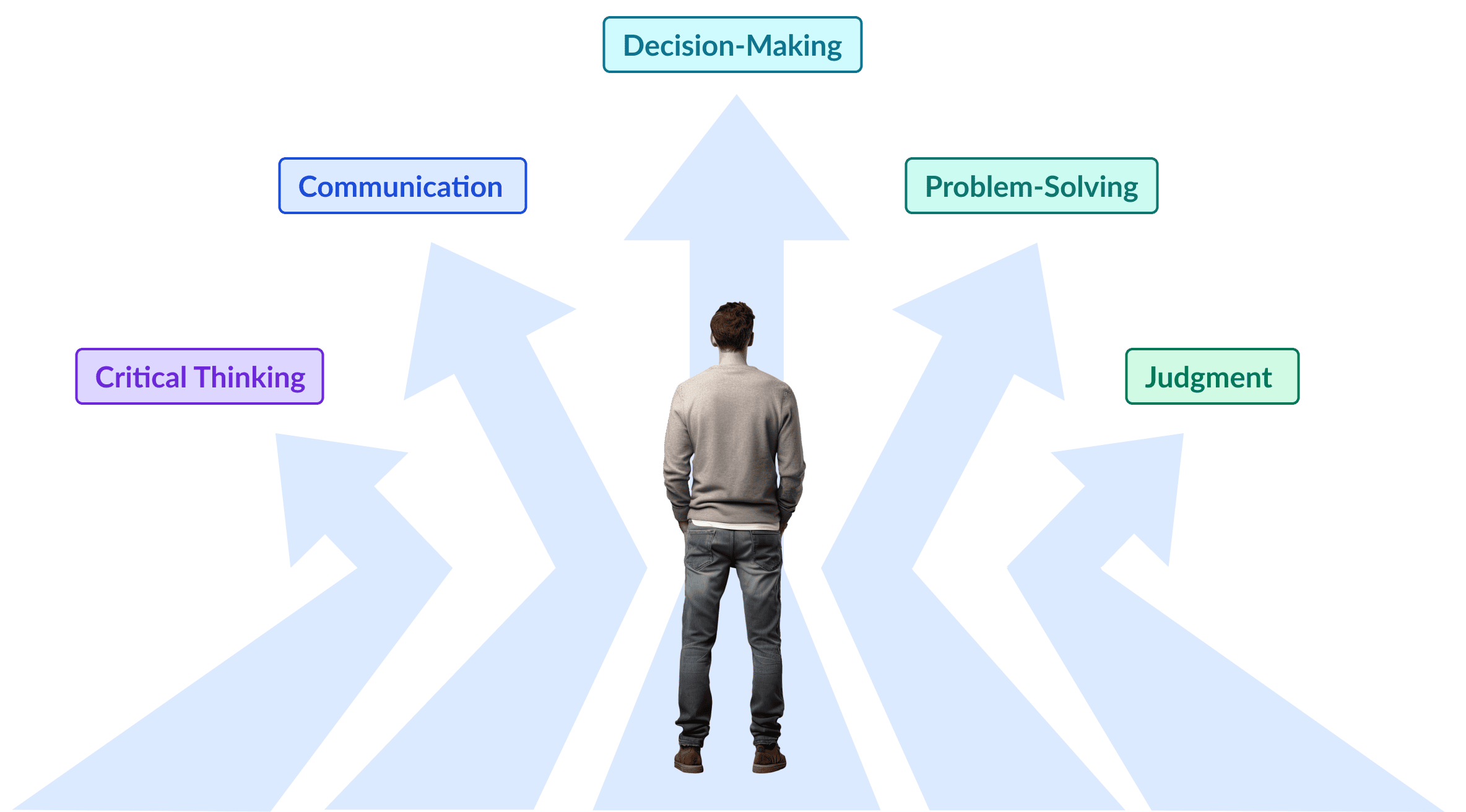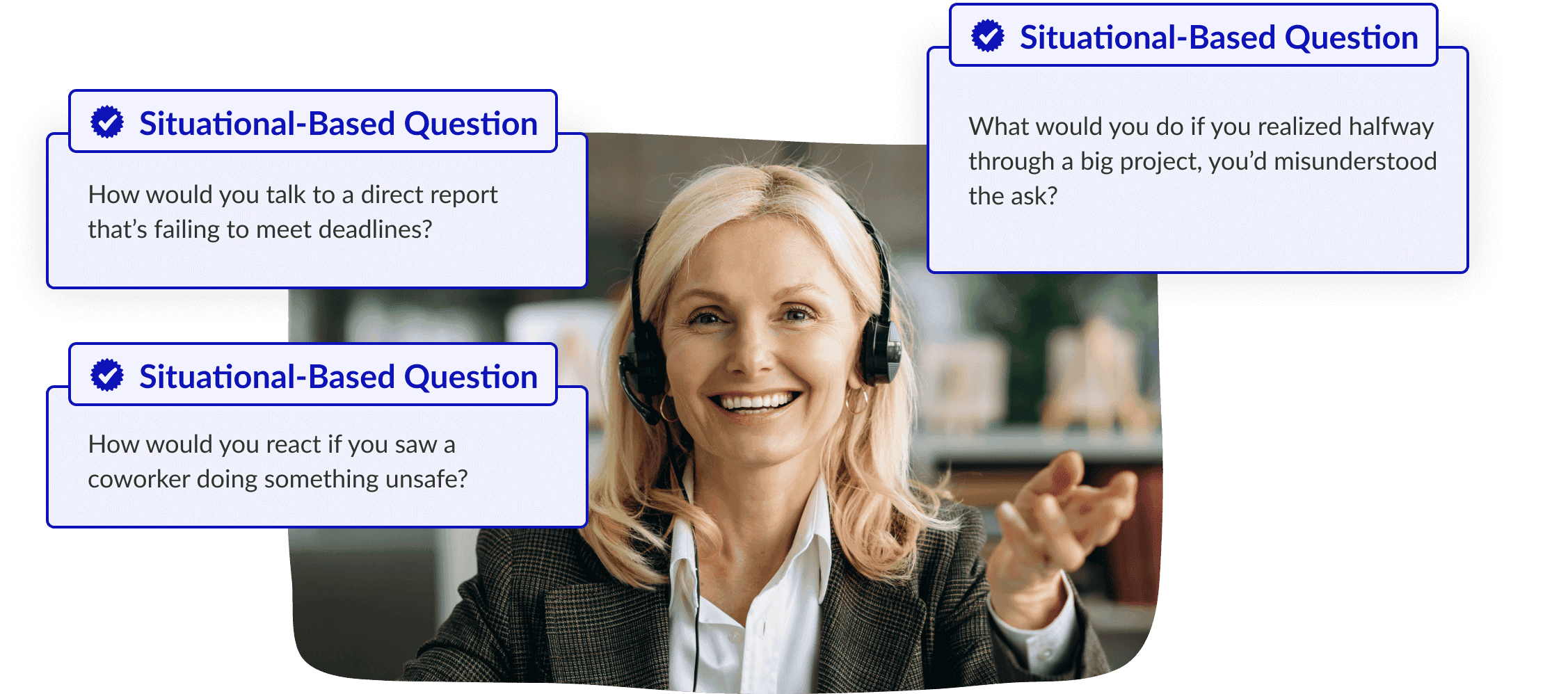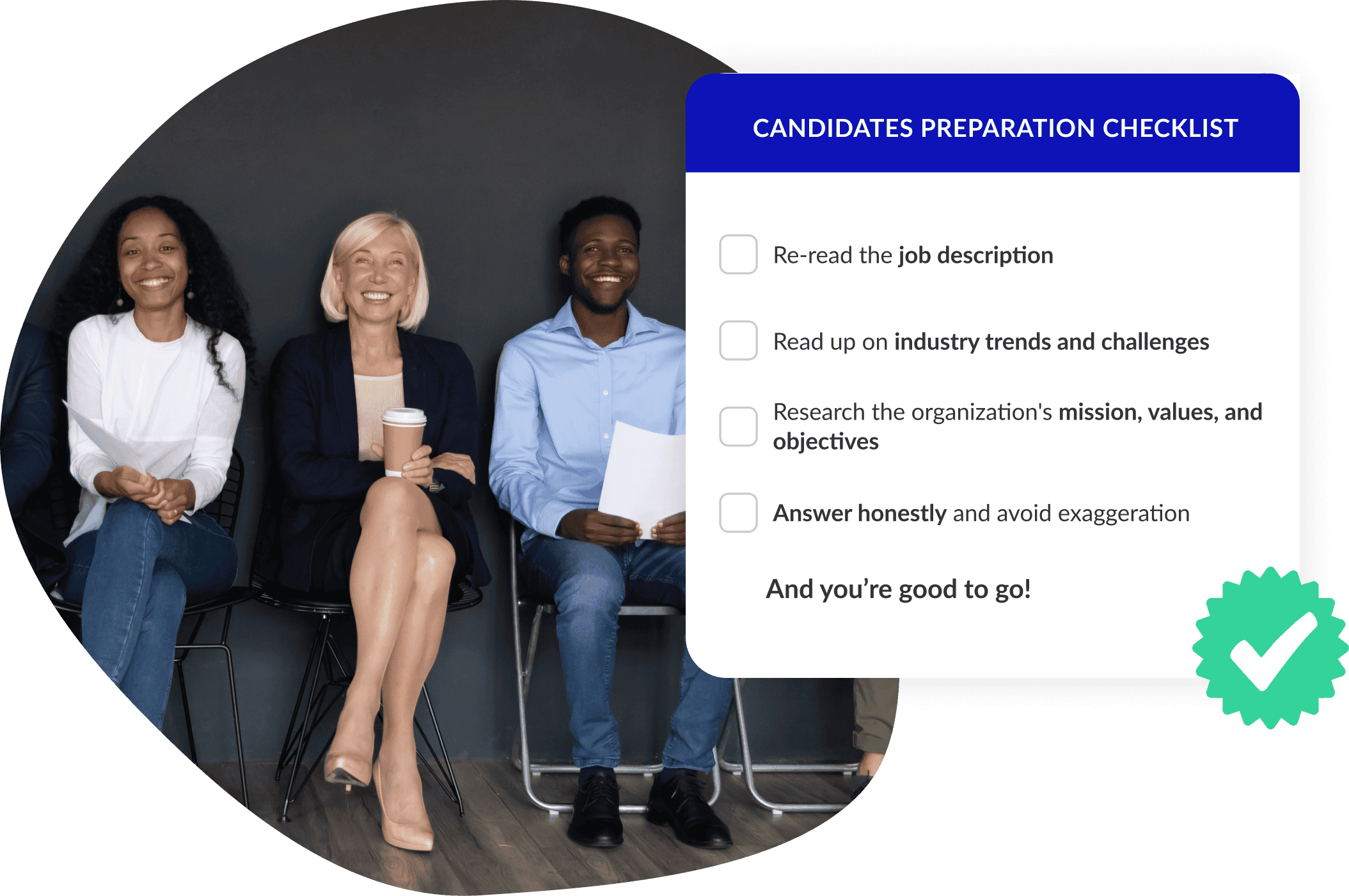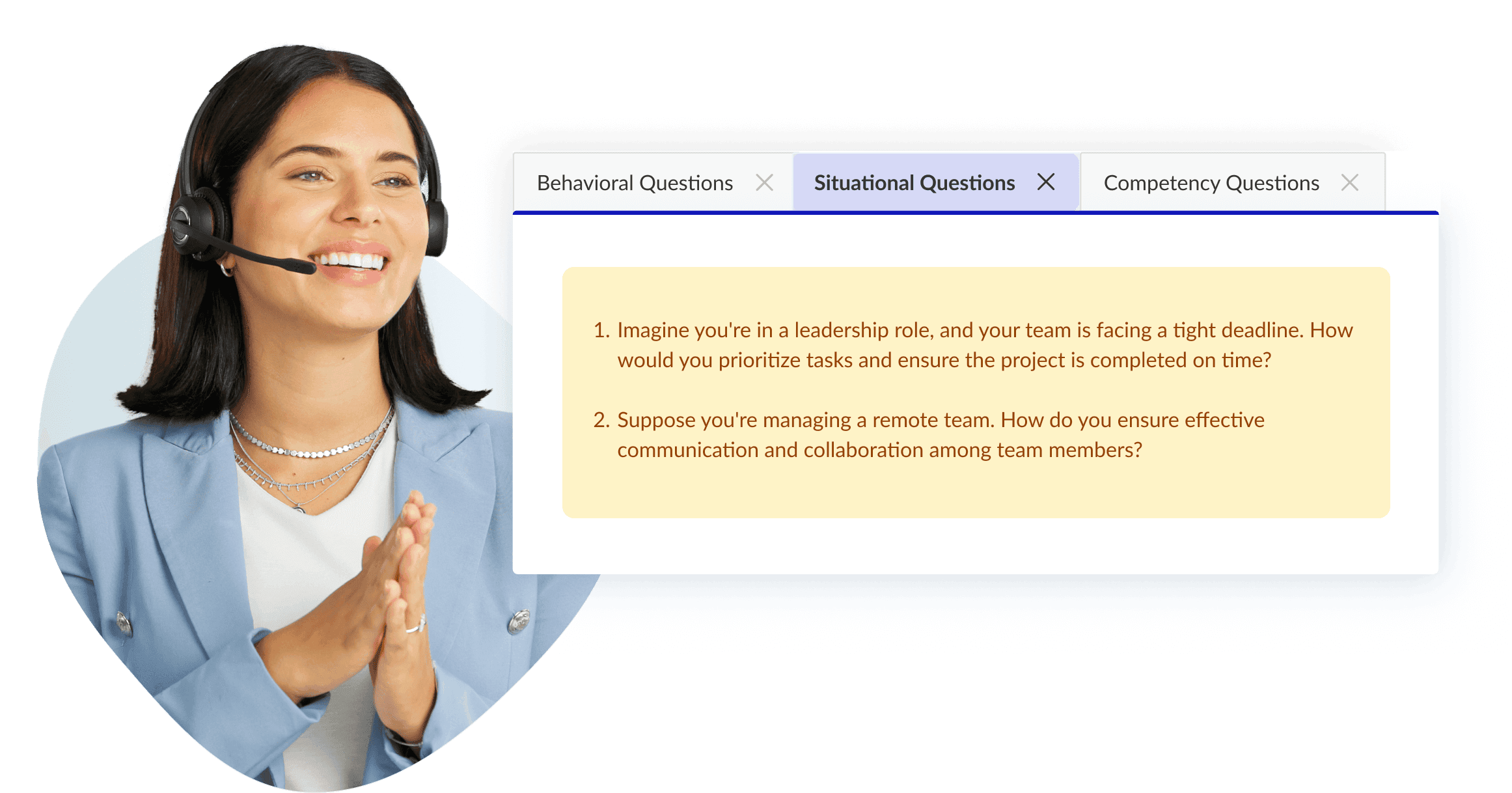
How To Screen Candidates Effectively
Conduct effective screening interviews today. We’ve collected industry best practices, expert tips, and practical advice.

TL;DR: What Are Situational Interview Questions?
Situational interview questions give candidates the opportunity to show you how they think through potential future work scenarios and communicate their thought processes. Asking situational questions within a structured interview can help you identify applicants who will thrive in a role based on what they say they would do.
Situational interview questions provide job candidates with hypothetical scenarios based on challenges they might encounter in the role they’re applying for. When answering, they have to think through the circumstances the hiring manager or panel interviewer describes and explain how they would respond in that specific situation.
Unlike behavioral questions, situational questions evaluate critical thinking and judgment rather than reflecting on previous experiences. The same way competency-based questions assess technical skills and abilities, situational questions can also be used to assess expertise, but instead of asking the candidate what they did in the past, you’re asking them to apply their knowledge to a hypothetical situation on the spot.
When comparing situational interview questions vs. behavioral interview questions or competency-based interview questions, it’s not about choosing to use one or the other. All types of interview questions have value.
Situational questions give insight into the candidate’s thought process, which is also a good predictor of future behavior. They reveal how the interviewee evaluates conditions, prioritizes tasks, communicates with team members, and looks for solutions.

Situational questions often start with phrases like:
“What would you do if…”
“How do you plan to…”
“How would you react if…”
There are several benefits to using situational questions, especially when the questions are created in advance and accounted for in an interview guide.
Gauge a candidate’s cognitive abilities
Answering these questions can demonstrate how candidates process information and work through problems. questions demonstrate how candidates process information and work through problems. You see how they evaluate options, use logic, deal with ambiguity, and find creative solutions.
Opportunity to showcase adaptability
These questions are more complex than other types of questions. For that reason, candidate responses tend to be more spontaneous. They’ll need to develop the bulk of their answer in real-time.
Make it easier to compare answers
Defined questions like these are much easier to rate and measure against each other. This is helpful when there are many other aspects of the interview process where direct comparisons aren’t possible.
Reveal strengths and weaknesses
Part of finding the right hire is understanding where they excel and where they struggle. This type of question, gives you a well-rounded perspective on the candidate’s capabilities.

Ask situational questions as part of a structured interview process
What kind of situational questions should you include in your interviews? It should depend on the job, the core competencies you are looking for, and organizational values.
However, certain competencies and skills come up more than others. This includes interpersonal and communication, time management, problem-solving, leadership and motivation, and ethics and integrity.
To clarify, just because you’re using situational questions to assess competencies doesn’t make them competency-based questions. In a competency-based question, the candidate can select a scenario from their past experience that exhibits the competency, with situational questions, you pick the scenario and they have to apply that competency to a role-relevant situation.
Here are some common types of situational questions and examples.

These questions present situations involving interactions with clients, colleagues, or customers. How would the candidate maintain composure, perspective, and professionalism in challenging conditions?
Example question
What does the answer tell you about the candidate?
"A colleague missed your team meeting without any notice or explanation. How do you handle it?"
How the candidate balances professional courtesy and accountability with coworkers.
How people manage their time provides clues to their operating style and organizational fit. In high-urgency settings, do they remain solution-focused? Or do they fixate on frustration and obstacles?
Example question
What does the answer tell you about the candidate?
"A client calls asking for an urgent deliverable in 2 days, but you have 3 other deadlines that week. How do you respond?"
How the candidate manages competing priorities and time-sensitive requests. It demonstrates their ability to negotiate deadlines and shows if they are a people-pleaser.
These kinds of questions test the candidate's ability to pay attention to details and find solutions as they work. They can also show whether or not the candidate is likely to take the initiative to resolve issues.
Example question
What does the answer tell you about the candidate?
"You get a project, but you don’t think there’s clear direction. How would you get the details you need to complete it?"
If they can think on their feet and find ways to be resourceful in a situation where they’re lacking information.
For management roles, try including scenarios involving rallying team members, overcoming conflict, or driving progress to reveal leadership instincts firsthand. Does the candidate communicate in a way that motivates others to take action? Do they focus on the collective mission to build buy-in?
Example question
What does the answer tell you about the candidate?
"A client requests features that will take your team 3 extra weeks. How do you communicate the impact on budget and timeline?"
How the candidate manages expectations and sets their team up for success. It demonstrates their ability to negotiate scope changes professionally.
Situational questions can allow you to assess moral character in a more nuanced way. Scenarios that present ethical gray areas or dilemmas reveal how candidates navigate tough moments.
Example question
What does the answer tell you about the candidate?
"You find out that a team member has been sharing confidential product information with a competitor. What would you do?"
How the candidate responds when faced with misconduct or breaches of policy. It helps you evaluate their judgment and principles.
Every interview process is different, and you may want to include guidance to set candidates up for success with situational-based questions.
Use these tips if you’d like to give them some direction on how to prepare:
Providing applicants with this guidance to help them prepare can improve candidate experience. If a candidate shows up to the interview and seems unprepared, that can tell you a lot about them as an employee.

Once you ask situational questions, how do you assess the responses you get from candidates? For candidate evaluation, the standard best practice is to use an interview scorecard to rate answers during the interview.
However, knowing what to listen for in the answer is half the battle. The STAR method is a structured technique candidates often use to answer behavioral or competency-based interview questions (Government of Northwest Territories). However, candidates can still use the STAR method to answer situational questions.
Why recruiters and candidates love STAR
On the recruiter’s end, using the STAR format prevents candidates from simply saying what they think the recruiter wants to hear. It also puts the responsibility on candidates to back up their thought process with evidence and logic (LinkedIn Talent Solutions).

In this context, STAR stands for situation, task, action, and result. Candidates describe a specific scenario, the problem or challenge in that scenario, the actions that address it, and the outcomes of those actions.
The best situational interview answers will showcase the following:
As part of interview training, teach interviewers to listen for details about how the person identified issues, weighed their options, and found solutions. Look for candidates who can make their case with maturity and accountability.
Here’s an example of how a candidate would use the STAR format to provide a more concrete answer to a hypothetical question aimed at evaluating leadership.
"A client requests features that will take your team 3 extra weeks. How do you communicate the impact on budget and timeline?"
Here’s an example of a non-STAR answer to the same question.
“I would say yes of course, and explain immediately that it will push the deadline out by three weeks and increase the budget. Depending on their initial reaction, I might have to negotiate before sending them an adjusted contract and project plan immediately, offering to answer any questions, and getting them to re-sign.”
As you can see, STAR answers are another way candidates can show you how they would exhibit the behaviors, knowledge, skills, and abilities you are looking for.
Situational questions are a win-win. Candidates get the chance to demonstrate how they would deal with scenarios that may be unique to your organization, and the hiring manager or panel gets a better idea of how new hires would perform in the day-to-day realities of the role. Use these strategies to craft smart questions, guide candidates to provide thoughtful responses, and assess them well.

The key is to make the questions as specific as possible to the role you are hiring for.
Source situations and challenges from the hiring manager and adjacent employees. Consider past issues and future scenarios the candidate might face.
If you conduct a job analysis, you can refer back to the findings to craft your questions and align them to core competencies.
Beginning an interview with complex hypotheticals can be jarring for candidates. Start with, or include, behavioral interview questions or competency-based interview questions to create a well-rounded discussion. Add situational questions in the middle of the interview, allowing observant candidates to tailor their responses to previously discussed competencies or behaviors. Also, have predefined probing questions ready to explore their thought process in greater depth if necessary.
If you want to get the most out of asking situational questions, keep these tips top of mind:

E-BOOK
The Modern Guide to Structured Interviewing
Get your free copy of VidCruiter’s comprehensive white paper about structured interviewing. This practical guide:
By providing email address, you agree to receive
updates from VidCruiter.
Read our
Privacy Policy
Modernize your hiring process with expert insights and advice.